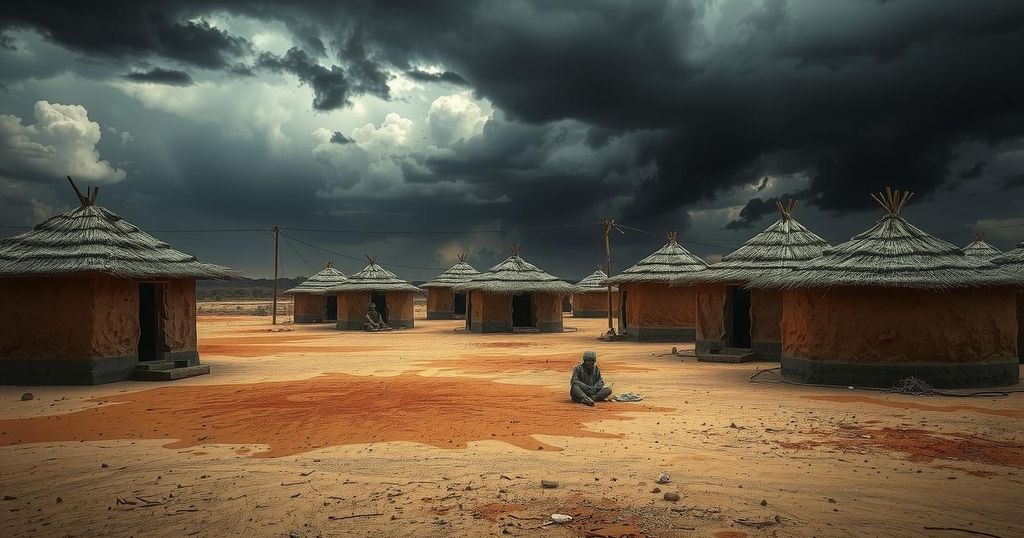South Sudan faces a precarious situation as escalating violence and political tensions threaten a return to war. The UN has warned that recent attacks and political mismanagement may derail peace efforts. Arrests of opposition figures and military confrontations exacerbate instability, prompting calls for dialogue and urgent international intervention to prevent worsening humanitarian crises.
South Sudan is on the verge of entering yet another cycle of conflict, as highlighted by the United Nations due to rising violence, intensified political tensions, and military confrontations that threaten the delicate peace process. The UN Commission on Human Rights has raised alarms over the recent increase in hostilities, notably in Upper Nile State, which could hinder the Revitalized Peace Agreement and exacerbate the humanitarian crisis in the nation.
A serious incident resulting in the deaths of UN personnel and high-ranking officers from the South Sudan People’s Defence Forces occurred with an attack on a United Nations helicopter in Nasir. This alarming event has drawn condemnation from the UN Commission, which classified the attack as a potential war crime under international law. The Commission attributes these instabilities to political mismanagement and significant delays in the unification of armed forces mandated by the Revitalized Peace Agreement.
Moreover, the Commission has highlighted divisions within the governing structures of South Sudan contributing to instability, specifically due to the targeting and dismissal of opposition leaders. Recent arrests, including that of Lt. Gen. Gabriel Duop Lam, the Chief of Staff of SPLA-IO, have heightened tensions. The ongoing military confrontations and militia mobilizations further escalate fears of a renewed large-scale conflict.
Yasmin Sooka, Chair of the Commission, has expressed that South Sudan should prioritize the enactment of the peace agreement provisions, bolster institutions, and foster a foundation for democracy. She emphasizes that instead, the country is regressing, which might undo years of progress. The leadership is urged to redirect their efforts towards the peace process and human rights.
The conflict over control in Nasir, where the armed group White Army has overwhelmed SSPDF positions, has intensified political uncertainty in the capital, Juba. The government has accused SPLA-IO of instigating this offensive, while swift actions against opposition figures incite fears of an aggressive government response that may jeopardize the fragile peace agreement.
The Commission has drawn parallels between the current situation and previous power struggles that led South Sudan into civil war, resulting in severe atrocities and humanitarian catastrophes. Commissioner Barney Afako noted the ongoing power struggles as a clear return to the chaos that previously afflicted the nation, stating that the population has endured enough suffering and deserves peace.
In a bid to avert further conflict, Kenyan President William Ruto has engaged in diplomatic dialogue with President Salva Kiir and First Vice President Riek Machar. Nevertheless, the Commission urges that unless the South Sudanese leadership participates in genuine discussions, the country may spiral back into war, emphasizing that solutions must come through dialogue rather than armed conflict.
The UN Commission is calling for urgent action from international stakeholders, including neighboring nations and the African Union, reminding all parties to the Revitalized Peace Agreement of their responsibilities regarding human rights and the transitional process. Unaddressed reforms, notably the Truth Commission and the Hybrid Court, perpetuate the underlying causes of conflict, risking a return to chaos for the civilian population that lives in constant fear.
In conclusion, South Sudan stands at a critical juncture, facing the potential for renewed conflict amid escalating violence and political discord. The UN Commission on Human Rights has issued dire warnings regarding the situation, urging leadership reform and international intervention to uphold peace agreements. Without decisive actions to address grievances and implement essential reforms, the nation risks plunging back into chaos, devastating the lives of its citizens.
Original Source: chimpreports.com




